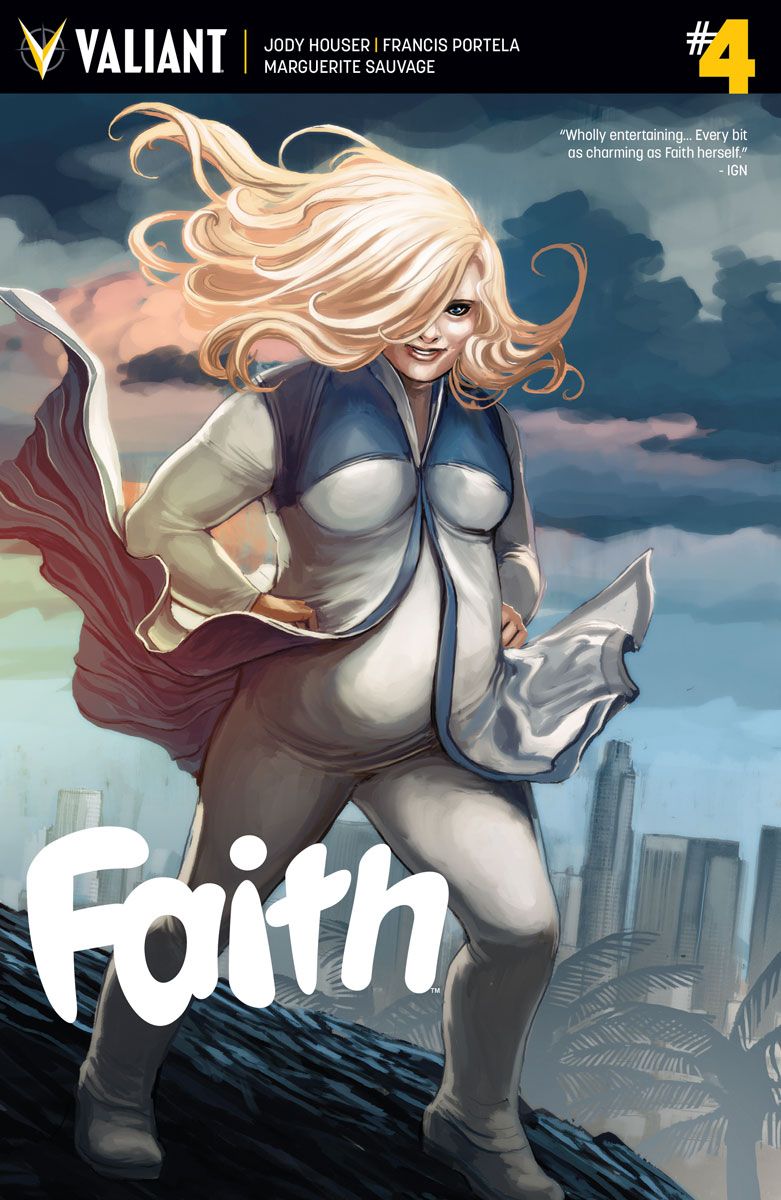"Faith" #4 offers a conclusion of sorts. The issue caps off the four-part miniseries before the character's first ongoing kicks off in July, and it fittingly reads as both a beginning and an ending. Though Faith and her allies do have a climactic, superheroic battle with the Vine, she also spends the last pages settling in and enjoying her new life. Jody Houser continues to write an open, relatable and admirable protagonist whose voice always has me hooked. Francis Portela, Andrew Dalhouse and Pete Pantazis have an eye for making L.A. look like L.A. without dipping into parody, and Sauvage's pages are as beautiful as ever. As "Faith" wraps up, it's easy to see why it got the attention -- and deserved continuation -- that it did.
Admittedly, the battle with the Vine is something of an anticlimax. Just as their motives were hastily explained in previous issues, their defeat is quickly and summarily achieved in this one. When the Director threatens that the Vine will rise again, Faith simply says, "They can try. We'll just have to stop them again." G.A.T.E arrives to clean things up in a panel that explains nothing about their involvement, except that "Hadley agreed to provide testimony to G.A.T.E. I hope she'll be okay." All these details make it clear that the Vine aren't the interesting part of this story.
While this makes the denouement less fulfilling to read, it fits the logic of the book. The strength of "Faith" has never been the villains; it's the protagonist. Faith's journey is therefore more important than the logistics and arrest of the Vine. Indeed, her one-on-one struggle with Torque is the core of the big battle. It calls on her strengths as a person and a psiot, asking her to "find the real John Torkelson in the illusion...find the real him." It's an incredibly satisfying display of her real power: empathy.
This focus on Faith's voice and personality is still an asset to this series. Houser makes her as plainly vulnerable as she is eternally optimistic. She shows panache and joy in lines like, "Saving the world is the best kind of date," but her heroism comes out stronger in her doubt. For instance, when planning the attack on the Vine, she says, "Maybe I could [take down the bad guys on my own]. But I don't want to try to solo title this with so many lives at stake." There's an easy generosity and self-awareness to her model of heroism.
Francis Portela does fine work capturing both the emotional and physical aspects of this series. The talkier scenes are grounded in intense, often funny facial expressions that complement the frankness of Faith's captions. Meanwhile, in the fight scenes, Portela conveys Faith's psiot powers clearly -- if a touch obviously, with the swirling white winds. "Faith" also has a nice sense of place, driven home by colorists Andrew Dalhouse and Pete Pantazis, who know how to capture the look of dry L.A. light.
Sauvage's fantasy sequences are gorgeous. She also draws her first non-fantasy sequence in the series thus far -- a smart and moving touch. It's a flashback to Faith's childhood, on the day of her parents' funeral. Lost and sad, young Faith reaches for her comics, as her present self narrates about "Stories...that are there when we need them the most..." Having Sauvage, who usually draws elaborate fantasies, draw this scene reinforces the power of stories, particularly the way that the best fantasies can bleed into reality and make a terrible day seem better.
"Faith" #4 is a warm, generous issue that left me even more delighted about the continuing series. I'm entirely sold on the potential of this character.

